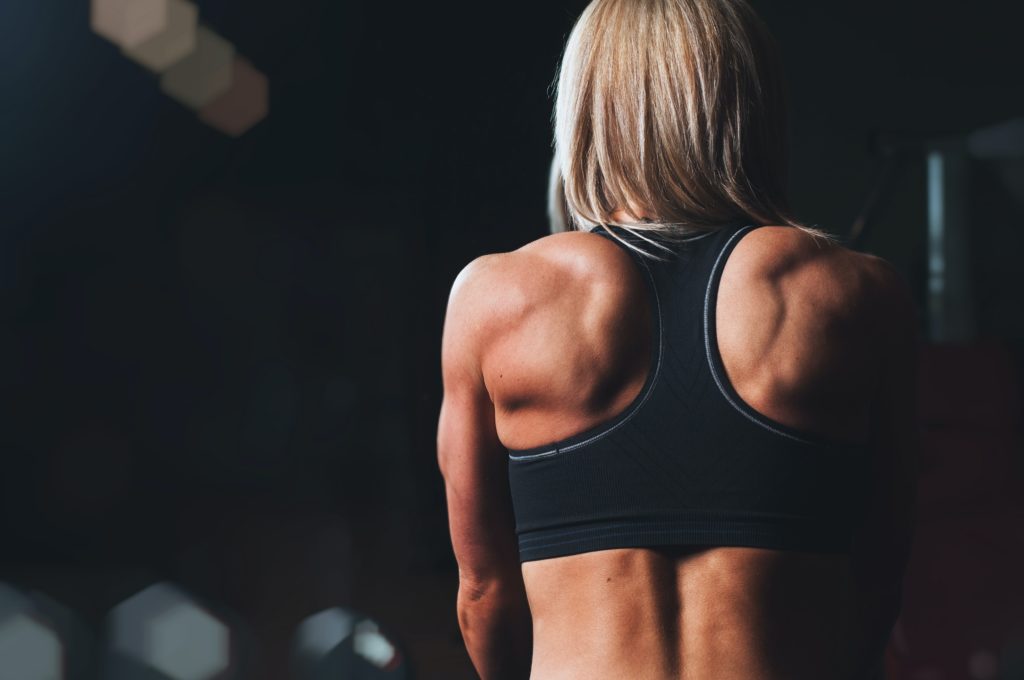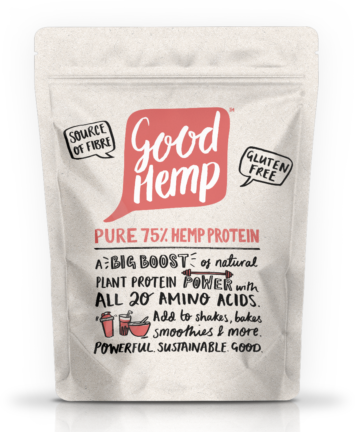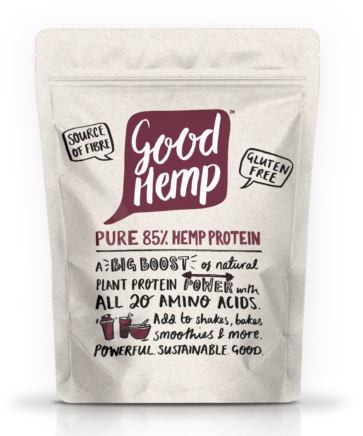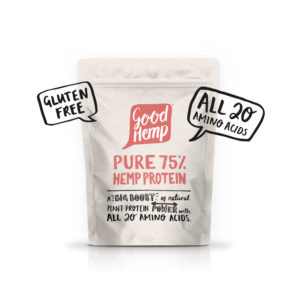How Much Protein Do You Need Per Day to Build Muscle?
The equation for building muscle is simple: strength training + protein = gains. But just how much protein do you need to eat per day to promote muscle growth? And what if you don’t eat meat? Can you get the same amount of protein as a veggie?
The short answer? The recommended daily protein intake, according to the British Heart Foundation, is around 0.75g of protein per kilogram of total body weight. That comes down to 45g for the average woman and 55g for the average man. If you work out more than once a day, you should double that amount to 1.5g of protein per kilogram of body weight (90g for the average woman and 110g for the average man), but the Department of Health advises against consuming any more than that.
Your protein goals are easily reached with a healthy diet, and at Good Hemp, we believe that the healthiest diet is one that is good for you and for the planet. That’s why we’ve created a range of vegan hemp protein powders that can help you increase your protein intake whilst avoiding climate destruction and animal suffering. Everybody wins!
Now that we’ve got the basics covered, let’s delve some more into the wondrous world of protein for muscle gain.
Calorie Consumption vs. Lean Body Mass
Deciding on your exact protein goals requires a good strategy and a bit of maths. Typically, there are two camps: the one that advises a daily protein amount as a percentage of your total calorie consumption, and the one that’s based on how much you weigh.

Camp Total Calorie Consumption
Camp Total Calorie Consumption focuses on protein as one of the parts of an overall balanced diet. The thinking here is that carbs and fats are just as important as protein and can’t simply be substituted altogether.
With bulking and shredding, for example, protein tends to take centre stage, whereas you actually need quite a lot of carbohydrates for sustained muscle growth too. Carbs are the main energy source of the human diet and play an important role in muscle growth and restoration. Fats also give your body energy, in addition to playing an important role in cell growth and protecting the organs. A specific group of fats known as essential fatty acids (omega 3 and 6) are particularly important as they help regulate blood pressure, the immune response and liver functioning. You therefore need to ensure you include all three in your diet, and that’s why you might want to set your protein goals based on your total calorie intake.
How Much Protein Should You Take per Calorie?
According to the Vegetarian Resource Group, only around one out of every 10 calories you take should come from protein – you can up this amount if you are in the early stages of training or work out more than once a day. In calculating the percentages of protein you’re consuming relative to your total calorie intake, remember that:
- Each gram of protein contains 4 calories
- Each gram of carbs provides 4 calories
- Each gram of fat provides 9 calories
Camp Lean Body Mass
The philosophy of Camp Lean Body Mass is that you’re consuming an amount of protein per day that is based on the actual state of your body, rather than your total calorie intake, which is easily upped or downed. This method defines how much protein you should consume in a given day based on your lean body mass, which is calculated with the following formula:
Lean Body Mass = Body Weight – (Body Weight * Body Fat %)
You can find out your body fat percentage at your local gym, or with one of those fancy body fat monitoring scales. If they make you feel bad, just remember those good things we said about fats earlier!
How Much Protein Should You Take per Kg?
The recommended amount of protein per kg of lean body weight lies between 0.75g/kg for an average person and 1.5g/kg for someone with an active workout regime.
Protein for Muscle Gain: The Role of Amino Acids
If you’re on the muscle gain train, having an understanding of complete proteins is vital to getting the results you’re after. Complete proteins are food sources that contain all 20 amino acids, including the nine essential ones that the body can’t produce on its own. These nine essential amino acids are the building blocks for muscle growth — they also help decrease muscle fatigue and alleviate muscle soreness, which you’re going to thank them for later!
If you’re serious about working out, you’ve got to eat complete proteins – and if you aren’t sure how, you can start by using our vegan protein powders in your pancakes, porridge or morning smoothie. You’re welcome!

When to Take Protein
According to the Association of British Dieticians, it’s best to spread out your protein consumption evenly throughout the day to optimise muscle repair after intense exercise. If you’re unsure of how to do that, we have created some tasty protein-packed recipes for breakfast, lunch and dinner so you’ll never run out of ideas.
Can You Hit Your Protein Goals With Just Plant-Based Foods?
Yes, you can! Contrary to what some might think, plants can contain all essential amino acids – be it some at lower levels than animal protein. Studies have shown again and again that you can base your diet purely on plant-based foods and still meet all your energy requirements and essential amino acid needs. That means that even your most challenging workout can be powered by plants. And that’s how we like it.
We don’t mind whether you’re Team Total Calorie Consumption or Camp Lean Body Mass, as long as you join us in Team Plant-Based Protein! The list of vegan protein sources is long and ranges from tofu to tempeh and from green peas to hemp seeds. By the way: we sell them!
Protein: Part of a Balanced Diet
We’ve been talking a lot about bulking up, and how to get protein on a plant-based basis. But what we care about most at Good Hemp is your health and wellbeing, which includes having a balanced diet. Life isn’t all about proteins, even if you’re trying to build muscle. Omega-3, fibre, iron, magnesium, carbs and fatty acids: they all do their bits in keeping your body running – quite literally.
Our range of hemp protein powders can help you get a lot of the goodies (fibre, omega-3, iron, magnesium) without any of the baddies (additives, artificial flavourings, nasties). We love them to bits and hope they can help you too on your muscle gain journey.

Armed with new knowledge, we hope you’re now well on your way to becoming more buff in a sustainable manner for you and the planet. Now go forth and flex!


